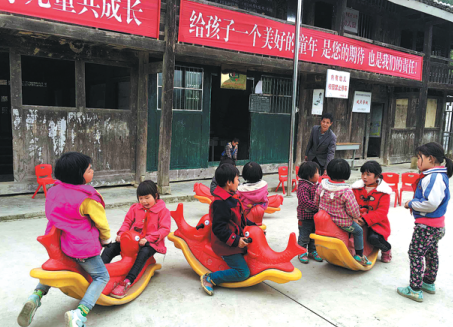A one-man education army in mountains


Song Changcheng plays with children in the kindergarten in Sinan county, Guizhou province. CHINA DAILY
Song Changcheng leaves his home at 7 in the morning to go to Shanshupo and Fujiazhai villages in Sinan county, Guizhou province, to "collect" his nine "kids" aged between 3 and 5 because he believes they should be accompanied by an adult while walking through the mountains to school.
Carrying the youngest, Jiao Shaoting, on his back, Song leads the other eight children on a path meandering through the mountains in the morning mist. After school, Song takes them back home before sunset.
With their parents working as migrant workers in cities, most of the children live with their grandparents. And they call Song grandpa.
Song has been accompanying children to and from school for 32 years, during which the dirt path has given way to a concrete road and hundreds of children have graduated from the former Shanshupo village primary school that had only two teachers for most of the time before 2016, when it was transformed, thanks to Song's lobbying the education bureau, into a one-teacher kindergarten for "left-behind children".
Moreover, before the local government started serving free lunch to the children in 2016, Song and his wife used to help the children to heat the food they brought from home to school. The couple also cooked some vegetables for the children at noon that they grew on the "infertile" farmland they cultivated on the mountain slop.
The free lunch given by the school is more nutritious than the food-mostly potatoes or sweet potatoes-the children used to bring from home. "Nutritious food can help the children grow stronger and taller, and look better," says Song's wife.
Were it not for the support of his wife, who now works as a migrant worker in the county and often comes back home to help him take care of the children, he would not have been able to help the children, Song says.
Song worked as a carpenter for six years after failing to clear the college entrance exam in 1979. But the villagers persuaded him, the only educated young man in the village, to teach in the small village school, along with an old teacher, in 1986 after two teachers quit their jobs. The teachers in the village school were paid by villagers, not the government.
Back then, when teachers working in cities enjoyed their summer and winter vacations visiting parents, relatives and friends, Song started visiting poverty-stricken families to persuade the parents to continue sending their children to school.
The villagers have lost count of the amount of tuition fees Song has paid for students from impoverished families out of his own pocket over the years to prevent them from dropping out of school. In fact, over the past 32 years, thanks to Song's efforts, not a single child has dropped out of school in Shanshupo village.
Considering that a carpenter's income could be more than that of a farmers-paid teacher in the 1980s and 1990s, Song thought of shifting to a city to find a better-paid job."I wanted to find a job in a city. But I didn't think the villagers could find a new teacher to fill the vacancy if I left, especially because many of the teachers left soon after joining the school," Song says.
However, after an education system reform in 1997, Song was put on the government payroll. That helped increase his income and, more importantly, provided him with more money to fund poor students' education. And thanks to his carpentry skills, Song almost singlehandedly maintained the old village school, a mud-and-wood structure, out of his own pocket before the government rebuilt it.
Song is a teacher, a father, a grandfather, a cook, a courier and a carpenter all rolled into one. He is the source of hope and inspiration for many migrant worker parents, because they can rest assured that he will take good care of their children, especially when it comes to their education, villagers say. After all, many of the parents were his students before they migrated to cities in search of better livelihoods.
A total of 64 students from the village, including his daughter, have elbowed their way into colleges, with 22 of them enrolling in key universities and one obtaining a doctoral degree from Harvard University.
"The lack of teachers is the biggest problem remote mountainous regions face when it comes to education. But Song has kept local farmers' hopes alive," says Huang Chaoxuan, an official of the county education bureau.
"If one man, no matter how poor he is, can help put an end to a generation's illiteracy and ignorance and an entire village's poverty, I will be that man," Song says.
MOST POPULAR
- 1 China to give visa-free treatment to another 9 countries
- 2 China fully opens manufacturing sector to foreign investors in landmark opening up move
- 3 China's import expo attracts record-breaking participating countries, exhibitors
- 4 China's door opening even wider to foreign visitors, businesses
- 5 China revises rules to ease foreign strategic investment in listed firms
Editors' Picks
 Video:
Peru sees new port open
Video:
Peru sees new port open
 Infographic:
China's public holidays for 2025
Infographic:
China's public holidays for 2025
 Infographic:
Basic facts of APEC
Infographic:
Basic facts of APEC
 Infographic:
Wrapping up the 7th CIIE: Data recap
Infographic:
Wrapping up the 7th CIIE: Data recap



